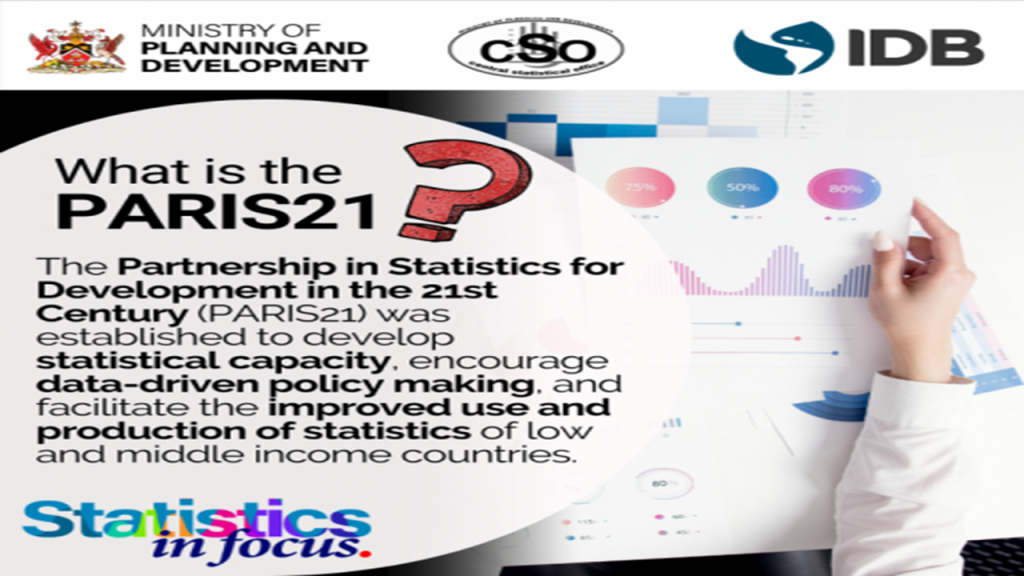In 1999, the Partnership in Statistics for Development in the 21st Century (PARIS21) was established through the combined efforts of the United Nations, the European Commission, the Organisation for Economic Co-operation and Development, the International Monetary Fund, and the World Bank. PARIS21 was created to develop statistical capacity, encourage data-driven policy making, and facilitate the improved use and production of statistics of low and middle income countries.
It encourages these countries to develop, implement, and monitor a National Strategy for the Development of Statistics (NSDS) whose main objectives are to achieve national and international development goals via the establishment of a complete and reliable statistical system that allows for informed decision making at the national level and which satisfies regional and international statistical commitments inclusive of the provision of Sustainable Development Goals statistical indicators.
A National Strategy for the Development of Statistics is the process and product for developing the statistical capacity of a country. It provides a continual assessment of the National Statistical System (NSS), creates goals for its development and sets milestones for their achievement. It provides the impetus for a country-led data revolution, integrating evidence-based research and statistical information into national policy and planning processes while producing high quality data that meets the needs of the various users.
The implementation of a NSDS is an inclusive process that is best served by involving all major players within the National Statistical System. The success of an NSDS depends on:
- Open dialogue between key stakeholders- government, civil societies, and the private sector in order for their needs to be met.
- Government funding and support from related partners.
- A robust NSS that provides frequent monitoring and evaluation of the SDGs.
- Strong political support bolstered by the use and integration of statistics in national development documentation
This, in turn, delivers a holistic view of socio-economic factors which then inform international treaties and agreements. The sharing of high quality, timely, accurate, and relevant statistical data on a continual basis across nations serve to provide improved livelihoods for citizens.
National Statistical Systems vary greatly in size and budget among countries. Generally, the smaller national statistical offices can be found in Small Island Developing States (SIDS). They are a group of countries which face unique developmental challenges due to their location, vulnerability to environmental threats, and susceptibility to external economic threats.
They can be found in the Caribbean, the Pacific, the Indian and Atlantic Ocean, the Mediterranean, and the South China Sea. Of the 51 SIDS, only a few, such as Trinidad and Tobago together with Jamaica can boast of a statistical staff amounting to more than 300 persons.
The National Statistical Systems in SIDS often have limited financial resources, a narrow skills base for staff proficient in statistics and demography, poor data reporting processes, low statistical capacity, the absence of data sharing agreements between major players, and users with limited understanding of and appreciation for evidence-based decision making.
The role of regional bodies, such as the Caribbean Community (CARICOM), in strengthening the national statistical systems of small island developing states cannot be overstated; they can ensure effective statistical systems, foster stronger cooperation between countries, and leverage long term support from the international community on a long term basis.
CARICOM, the oldest surviving integration movement in the developing world, was established in 1973 by the then Prime Minister of Barbados; the Hon. Errol Barrow, the Hon. Forbes Burnham, Prime Minister of Guyana; the Hon. Eric Williams, Prime Minister of Trinidad and Tobago; and the Hon. Michael Manley Prime Minister of Jamaica in the Treaty of Chaguaramas.
These founding fathers recognised the importance of statistical integration for the achievement of the region’s goals and aspirations. It led to the creation of the Standing Committee of Caribbean Statisticians (SCCS), one year later, in 1974. Its objectives were to “foster increased recognition of the importance of adequate statistics services to the countries of the region; to widen the scope and coverage of statistical data collection; and to improve the quality, comparability, and timeliness of statistics produced.”
The SCCS has recommended the development of a Regional Strategy for the Development of Statistics (RSDS) with similar goals and objectives for the NSDS but at a regional level.
These objectives, once met, will result in harmonised statistical data that can be utilised across the Caribbean region for our continued development.
Author: Central Statistical Office
